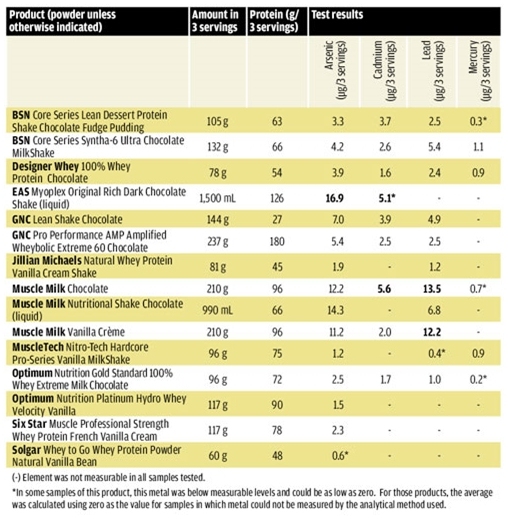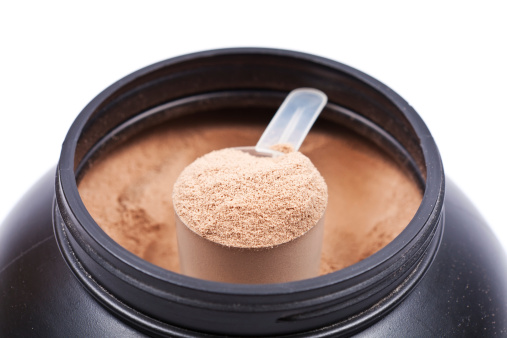Consumer Reports Sounds the Alarm!
Consumer Reports, one of the most trusted guides for buying reputable products, has found heavy metals in protein supplements and is warning you to use caution.
Officials for Consumer Reports say they purchased 15 protein powders and drinks mainly in the New York metro area or online and tested multiple samples of each for arsenic, cadmium, lead and mercury.
The results were very disturbing, considering how many people consume these highly processed food products and how MUCH they consume per day.
The results showed a considerable range, but levels in three products were of particular concern because they exceeded the daily exposure limits proposed by USP for arsenic, cadmium or lead. This is if you assume 3 servings per day which is the average for most consumers. Some eat more and some eat less. For many products, levels of those contaminants were in the ‘low to moderate range.’
Personally I would not find even ‘low to moderate’ exposure acceptable considering how many other toxic products we find in our environment. We have enough health considerations just dealing with life without wondering about a product we specifically consume for health or fitness!
Cadmium exposure is particularly scary because it accumulates in and can damage the kidneys, the same organs that can be damaged by excessive protein consumption. It can take 20 years for the body to eliminate even half the cadmium absorbed today.
Imagine what will happen to the large group of teenagers and twenty-somethings wanting to ‘bulk up’ today. They are the ones who eat a LOT of these products and who may be in for a very unpleasant surprise some time from now.
“This (Cadmium) is a highly toxic metal, and while there are some cases where decisions have to be weighed against relative risks, accepting that you have to be exposed to any cadmium at all in your protein drink after your workout is definitely not one of them.” says Michael Harbut, M.D., director of the Environmental Cancer Initiative at the Karmanos Cancer Institute in Royal Oak, Mich.
Even some plant sources can contain cadmium. This is because of the heavy use of cadmium-containing phosphate fertilizers in commercial farming. Potatoes, rice, sunflower seeds, spinach and other leafy greens are susceptible, but this is not a problem if you are eating organic.
Below is the average finding for three serving of the protein drinks.

You can see that Muscle Milk and EAS were the most toxic brands while the whey products faired better than the rest generally. This is just a small sampling of products. The protein powder you buy from the store may be better, but it also may be worse.
You can read the complete findings (5 pages) at Consumer Reports.
Why Bother?
Many health experts argue that very few people need high quantities of protein to begin with, and Consumer Reports points out there are many protein sources from the grocery store which can supply all the protein you need that are NOT toxic.
Protein is essential in the body for our muscles but is also necessary for most cell functions since it makes up enzymes, hormones and even DNA. Most protein is recycled, so unless you are growing rapidly or are breaking down the body with extreme physical exertion, there is no need for a LOT of new protein. Very few people in North America are protein deficient.
At Real Food for Life, we like to remind everyone that you can get all your protein requirements from whole real foods. Every single whole plant food has protein.
Beans, grains, seeds and sprouts have high levels of proteins, but fruits like oranges, bananas and even watermelons have complete protein. You just have to eat more of those foods which have lower levels. In North America, most people are generally eating a LOT of food. If that food was whole food, there is an abundance of ALL NUTRIENTS.
Copyright © Randy Fritz You are welcome to share this article with anyone who you think may benefit from this information as long as you give credit to Real Food for Life by including the link to the home page ww.RealFoodforLife.com or the direct link to this post.



Hi Randy,
Thanks for the health warning info.People do not understand how what they put in their mouth is so important. Nice job.
My question for you today is why do you not have a retweet button on your posts?I love to retweet health info like this when it is "hot of the press" as they say. I and others have deep customer bases. Safety is a priority. I do retweet all the info from Dr. Sharma of Alberta everyday. It is also very valuable.
Thanks for being there.
Pierre
THee Quest For Perfect Health
Thanks Pierre. I will put up a retweep button right away. I had a tweet/facebook/dig/everything button on the sight which did this but it was very complicated so I removed it.
Hi Randy,
Good on you for posting about this, the level of ignorance is alarming really.
If you'd like to add your site at Noaspa 2.0 , a new campaign to raise about the use of aspartame & sodium fluoride, you'd be most welcome at
http://noaspa.blogspot.com/p/noaspa-20.html
Best wishes from Hamburg
Will
The first step is to know your protein, and to realize that whey protein isolate is the best choice. Whey protein isolate is sold in whey protein powder form. Learn to read labels carefully to ensure that you are getting the right product – the one that contains everything you want, as well as the one that uses a manufacturing process that doesn’t filter out or reduce the beneficial nutrients of the product. Educate yourself, and you won’t have to depend on a sales clerk knowing what you need….you will know, and you will know how to examine labels to find what you do need. “